Bridge Builders Award
YMCA of Central Florida & Lockheed Martin
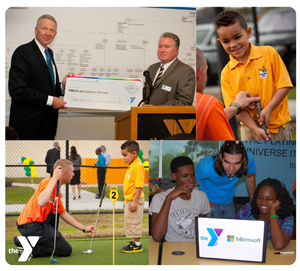
The YMCA's Lockheed Martin Technology Centers The Lockheed Martin Technology Centers located within the South Orlando and Tangelo Park YMCAs represent the best of what happens when partners join together for the good of the community. In addition to providing fun, high-tech learning experiences for at-risk youth, volunteers from the YMCA, Lockheed Martin and Microsoft inspire students to become the future engineers and scientists of tomorrow. Like every YMCA Youth Development initiative, this program provides the after-school safety, values and mentoring kids need to thrive.
YMCA Links2Learning With a shared commitment to youth development and social responsibility, the Y and Lockheed Martin also team up to support the YMCA Links2Learning program. Through this partnership, the YMCA's Lockheed Martin Technology Centers at South Orlando and Tangelo Park enrich the minds and lives of Central Florida students, inspiring and encouraging them to pursue careers in science, technology, engineering and math (STEM). These enriching programs impact over 20,000 students every year. One example of the programs' successes was introducing inner-city youth to a new sport ─ golf. The young program participants learn about the STEM skills behind the sport while the project also instills in the youngsters the qualities of civility, sportsmanship and values.
Jonathan Gamble, a computer science major at the University of Central Florida and Lockheed Martin intern, credits his educational success to the value of the Technology Center. "Through the Lockheed Martin/YMCA Technology Center, I didn't only grow to want to be in the engineering community, I became a part of it," Jonathan said. "The technology center gave me a place to learn more about engineering in a nice, safe setting with people with interest just like me, and my internship with Lockheed Martin successfully kick-started my career as an engineer."
Jonathan started attending the Technology Center's after-school program at the beginning of his high school career. With education and the help of mentors at the YMCA, he secured an internship at Lockheed Martin the summer before he began his computer science studies at the University of Central Florida.
"Jonathan was one of three Lockheed Martin interns hired from the Central Florida Technology Centers last year," said Quality & Mission Success Vice President John Varley. "All three will return this year with additional interns as we continue to grow this STEM-focused program."
The technology center continues to build lasting relationships with students to inspire them to pursue a technical degree in college, helping support our local community, workforce and country. From science experiments that teach students how to build paper airplanes and digital bridges to college preparation courses and tours at local corporations like Lockheed Martin, the technology centers enhance the curricula local students learn in their classrooms.
"The YMCA Technology Centers are helping develop the next generation of scientists and engineers to meet the needs of the United States and global security," said Varley. "By engaging these students in extracurricular STEM activities, we show them the real-world relevance of the concepts they are learning in the classroom."
The Lockheed Martin/YMCA program prepares students like Jonathan to excel in the classroom and community, developing well-rounded leaders for the future.
Read more »
Founders Award for Civic Leadership
Anthony Catanese
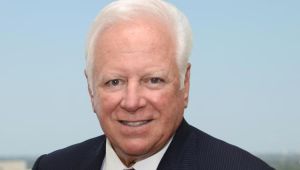
Anthony James Catanese is the president of Florida Institute of Technology, a major research institution with more than 16,000 students. Florida Tech emphasizes academic and research programs in engineering, the sciences, liberal arts, business, psychology and aeronautics. It has a major distance learning program using advanced technology. Such groups as the Carnegie Foundation and U.S. News and World Report rate it amongst America's top universities. The Times Higher Education Rankings from London places it among the best universities in the world.
Dr. Catanese was previously president of Florida Atlantic University, which grew to 25,000 students on seven campuses during his leadership tenure. He was the provost of Pratt Institute in New York City, dean of the College of Architecture at the University of Florida, dean of the School of Architecture and Urban Planning at the University of Wisconsin–Milwaukee, associate dean of the School of Engineering and Environmental Design and James A. Ryder Professor at the University of Miami, and professor and director of the Center for Planning and Development at the Georgia Institute of Technology. Dr. Catanese also was a Senior Fulbright Professor at the Pontificia Universidad Javeriana in Bogota, Colombia.
He holds a bachelor's degree from Rutgers University, a master's degree from New York University and a doctoral degree from the University of Wisconsin–Madison. A prolific writer, he has published 13 books, 18 chapters in books and more than 100 articles and monographs.
A member of the College of Fellows of the American Institute of Certified Planners, Dr. Catanese previously maintained a private practice in design, planning and development. His consulting contracts numbered over 50 clients, including coastal zone planning and development in Hawaii and native land claims in Alaska. As a developer, he built several projects for the single- and multi-family markets in Atlanta, Georgia.
Dr. Catanese has been a public servant as well. He was appointed by President Jimmy Carter to the National Urban Policy Task Force. He served as chair of the Milwaukee City Planning Board and the Gainesville City Planning Commission.
Dr. Catanese was president of the Park West Development Corporation, a not-for-profit group that planned and developed a major area in Milwaukee, Wisconsin. He was the founding president of the Florida State University Presidents Association. He also served as president or chairman of the Independent Colleges and Universities of Florida, Florida Association of Colleges and Universities, Florida Campus Compact, Atlantic Sun Athletics Conference, and Sunshine State Athletics Conference. He has served on numerous boards, including the National Collegiate Athletics Association, John Cabot University (Rome), Orange Bowl Committee, AvMed (South Florida), Wachovia Bank (Florida), Securit-E.com and Modus Operandi Inc.
Dr. Catanese was a past chairman of the board of the United Way of Brevard, as well as the 2006 campaign chair, and is on several local boards including the Maxwell C. King Center, Henegar Center, Leadership Brevard, and Central Florida Partnership.
He is the recipient of numerous awards, the most recent of which include the Chief Executive Leadership Award from the Council for the Advancement and Support of Education, Trailblazer Award from Rotary International, Diversity Champion Award from the Urban League, Outstanding College President's Award from the All-American Football Foundation, Golden Eagle Award from the Boy Scouts of America, Junior Achievement Hall of Fame, Space Coast Sports Hall of Fame, and Space Coast Business Leader. He recently was inducted into the Florida Institute of Technology Sports Hall of Fame and the Eckerd Brevard Walk of Fame.
Read more »
On Thursday, the National League of Cities released The 10 Critical Imperatives Facing Cities in 2014, its annual report highlighting ten of the most pressing issues facing cities across the United States. Partners board member and incoming NLC President, Salt Lake City Mayor Ralph Becker explained during the report's unveiling, "This is not a wish list just of cities. This is a wish list of the people who live in America. That’s 80 percent of the population of America that’s being represented through us."
The ten items on the list were:
- Fragile Fiscal Health
- Deteriorating Transportation Infrastructure
- The Shrinking Middle Class
- Inadequate Access to Higher Education
- The Need for Affordable Housing
- A Less-Than-Welcoming Return for Veterans
- Gang Violence
- A Broken Immigration System
- Climate Change and Extreme Weather
- Lack of Public Trust
Click here to read the full report from NLC, which includes an overview of initiatives being taken by cities in their own efforts to tackle these ten challenges and create more livable communities for their residents.
Read more »
Terms:Community Building, Community Development, Downtown Development, Economic Development, Education, Environment, Health & Wellness, Housing, Immigration, Neighborhood Revitalization, Other Reports/Publications, Placemaking, Public-Private Partnerships, Transportation, Urban
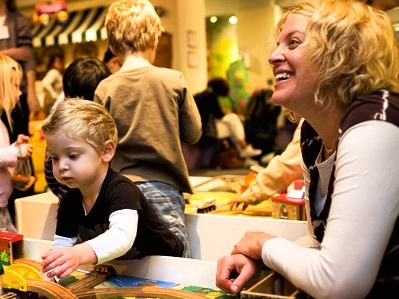
The Habitot Children’s Museum first opened its doors in downtown Berkley in 1998, and the institution has served over 950,000 residents of underserved communities in the Bay Area since. The 7,000 sq. foot facility is home to exhibits that help teach kids about the value of physical activity, water preservation, and art and culture. The hands-on Museum encourages early childhood education and aims to help support a generation of curious and creative kids.
Read more »
Terms:Arts & Culture, Community Building, Creative Economy, Cultural Institutions, Downtown Development, Education, Families, IFC Best Practice, Institutions as Fulcrums of Change , Museums, Youth
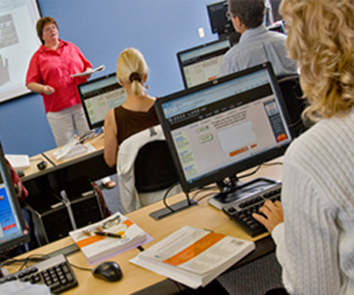
In today’s economic climate, trying to find a high-paying job without a college education is nearly impossible. That is why the leadership at Indiana University-Perdue University Indianapolis started their Community Learning Network that focuses on continuing education and lifelong learning. Each year the network provides more than 600 continuing education classes to over 7,000 residents in Central Indiana.
Read more »
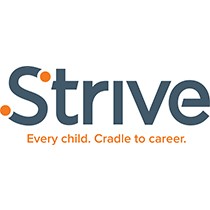
The Strive Partnership is an effort launched by community leaders in the Cincinnati region in 2006 that relies on innovative strategies to improve student education outcomes. The Partnership has designed a strategic approach to education reform that can be applied to communities throughout the country. The approach relies on a collaborative effort from community stakeholders from all sectors of the economy to encourage learning and development beyond the walls of their schools.
Read more »
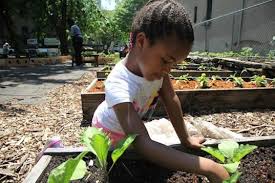
Head Start is a federal program designed to promote school readiness by enhancing the cognitive and emotional development of pre-school aged children. Through a program called “Eat Play Grow,” a series of obesity prevention classes are offered by the Children’s Museum of New York and the National Health Institute to be held in classrooms throughout New York City. Nonprofit groups throughout low-income areas in New York teach classes to children in underserved communities. Classes are held at common neighborhood institutions, such as community centers and libraries.
Read more »
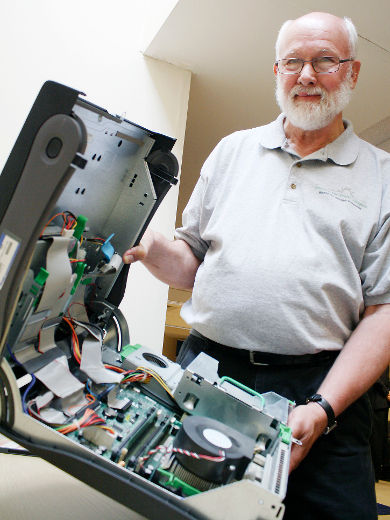
Project Phoenix is an intergenerational program based in Wellend, Ontario, just outside of Niagara, run jointly by the nonprofits Seniors for Youth Niagara and Youth Resources Niagara. The program aims to close the gap between seniors and youth for the purpose of improving the community by giving senior volunteers a chance to interact and share their knowledge and experience with at-risk youth in the area.
Read more »
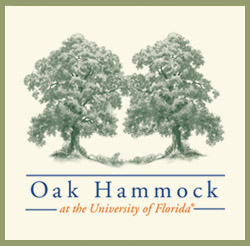
When Dr. Gordon Streib, a sociology professor at the University of Florida, first pitched the idea of sponsoring a retirement community on the UF campus in 1997, it was understandably met with skepticism by the University leadership. It would seem difficult for the late-night lifestyles of college students and the generally more peaceful temperaments of senior citizens to coexist. Nearly 10 years after the retirement community opened its doors in 2004, however, the establishment of the Oak Hammock Retirement Home has proven to be such a resounding success that there is already a waiting list to get in.
Read more »
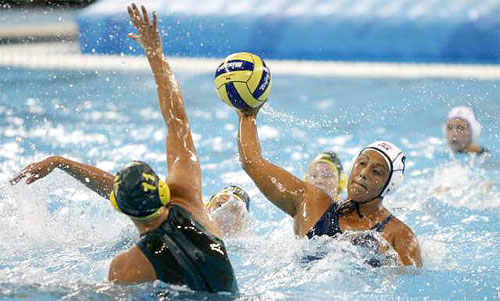
When kids from Commerce, a small working-class city outside of Los Angeles, are asked who their heroes are, they will, more often than not, mention local residents Brenda Villa and Patty Cardenas. Villa and Cardenas were both key members of the Women’s Olympic Water Polo Team from the 2008 Olympic Games in Beijing, China, and they are both products of the Commerce Water Polo Club.
Read more »
Inner-city Detriot may not be the first place one thinks of when looking to learn golf, but that is precisely where Renee Fluker founded her immensley successful Midnight Golf Program a dozen years ago. The program is a 30 week mentoring experience that not only teaches students about golf, but also about a number of essential life skills. The organization uses golf as a medium to teach children important life lessons, such as strategic thinking and how to deal with frustration and failure.
Read more »
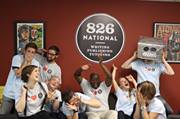
Founded in 2002 in San Francisco, California, 826 is a nonprofit that runs eight writing and tutoring centers for students aged 6-18 nationwide. Each writing and tutoring center provides after-school tutoring at least four days a week, writing workshops to spark students’ interest in the subject, scholarships to helped under-privileged children gain access to a college education, and a variety of other initiatives to help the most at-risk youth further their educational endeavors.
Read more »
Recess for seniors may sound unusual, but it is just one of many volunteer roles that the Rochester School District’s Office of Extended School Programs has developed to increase community involvement in its elementary schools. The Rochester School Department defines as its goal the enhanced achievement and academic success of students who participate in extended-school programs. Volunteers play a key role in support of these programs. The Office organizes enrichment programs by sharing resources, creating partnerships with businesses and community organizations, and involving parents.
These programs have proven to be a boon to both students and volunteers, many of whom are older adults. Intergenerational activities benefit senior volunteers, who take pleasure in giving back to their communities and participating in a structured social environment. They often exult in the joy of working with children.
Read more »
 photo credit Phoenix New Times photo credit Phoenix New Times
The Arizona Science Center has long engaged adult volunteers age 50+ as docents, and in
other conventional volunteer roles, but only recently the Center began to tap volunteers’ science and technology skills to enhance its programs. Jan Stonebraker, the Science Center volunteer coordinator of four years, entered the position as the Center launched a large travelling exhibition titled Body Worlds 3, an exploration of biology and anatomy.
Stonebraker identified knowledgeable volunteers to help staff the exhibition. At around the same time, the Virginia G. Piper Charitable Trust funded a leadership grant program, through the National Council on Aging (NCOA), to engage adult volunteers age 50+ in leadership roles. The Science Center development staff and Stonebraker designed a program that would qualify for a grant. Stonebraker found that many volunteers were retired mechanical and electrical engineers, information technology specialists, and science teachers who wanted to help the Center. It made eminent sense to use their skills to enhance educational programs.
Read more »
Terms:2012, Aging, Aging in Place, AIP Best Practice, Arizona, City Leaders Institute on Aging in Place, Community Engagement, Education, Intergenerational, Jobs, Life-Long Learning, Museums, Public-Private Partnerships
 photo credit Massachusetts Cultural Council photo credit Massachusetts Cultural Council
The Elder Arts Initiative joined artists, government, and service providers to engage older adults in the artistic process. Participants in the Elder Arts Initiative learned interviewing skills and techniques employed in the creative process, and had the opportunity to take part in a mentorship or pilot project of their own. Though considerable funding was curtailed in 2002, the Massachusetts Cultural Council (MCC) continues to support local arts programs in the state through grants.
The Initiative began in 1996, when the Cultural Council, the Massachusetts Extended Care Federation (an association of nursing homes), the Executive Office for Elder Affairs, and the State's Council on Aging held a series of meetings about older adults and the arts. The Cultural Council then launched the Initiative in 1997.
The National Endowment for the Arts provided funding for the Initiative through its Challenge America Program Initiative and "Artists and Communities: America Creates for the Millennium Program." For older adults, the benefits of the Initiative included social interaction, an enhanced sense of purpose, a window for introspection, and improvement in physical health. In addition, the Initiative enabled older adults to communicate their wisdom and experience to younger generations.
Read more »
Housed in a stunning building designed by Frank Lloyd Wright, ASU Gammage at Arizona State University, one of the largest university-based theaters in the world, has been broadening its audience for many years. Its outreach extends to both immigrant and older adult audiences. Widely recognized for its work in Phoenix, ASU Gammage’s commitment becomes evident in the role played by one of its staff members: Michael Reed, the senior director of Cultural Participation and Programming, is responsible for developing and overseeing an astonishing array of performances, including explorations of theater arts for all ages, and programs highlighting the arts of various cultures.
The commitment to accommodating older adults, for example, was demonstrated while The Phantom of the Opera was at the theater for a four-week run. To better suit the preferences of older adult audiences, some performances were scheduled as matinees. Reed also explains that the house staff is very experienced in working with older adults and those who are frail or have disabilities. The staff works with ARTability, an Arizona organization that promotes accessibility to the arts for those with disabilities. Before each season begins, the staff reviews issues related to the Americans with Disabilities Act (ADA), though Frank Lloyd Wright’s design, while handsome, has made retrofitting ASU Gammage to meet the requirements of the ADA, and other evolving audience needs, quite difficult.
Read more »
Terms:2012, Aging, Aging in Place, AIP Best Practice, Arizona, Arts & Culture, City Leaders Institute on Aging in Place, Community Engagement, Cultural Institutions, Diversity, Education, Immigration, Intergenerational, Mobility, Youth
 photo credit Osher Lifelong Learning Institutes photo credit Osher Lifelong Learning Institutes
Now a network of 117 higher education institutions spread across the country, Osher Lifelong Learning Institutes (OLLI) offer college-level courses designed to appeal to the interests and experience of older adults. OLLI programs are adapted to the needs and desires of the communities they serve, but they benefit from OLLI’s National Resource Center, which provides a network for sharing innovations in lifelong learning and also sponsors an annual conference. The institutions comprising OLLI range from top research universities to community colleges, and all provide unique programs.
Duke University’s is one of the most successful Osher Lifelong Learning Institutes in the country. The program began as the Duke Institute for Learning in Retirement, which was founded in 1977 as a joint venture between Duke Continuing Education and the Center for the Study of Aging and Human Development. Duke became one of the Osher Lifelong Learning Institutes in 2004.
Read more »
Terms:2012, Aging, Aging in Place, AIP Best Practice, Arts & Culture, City Leaders Institute on Aging in Place, Community Engagement, Education, Museums, National, Regional Cooperation, Town-Gown, Transportation
 photo credit Project SHINE photo credit Project SHINE
“When I first came to America, I only knew a couple letters. I couldn't communicate with anybody. And I learned about this program and I started (to learn English). I have been here for three years and now I have built a basic vocabulary that I can carry my daily life. It basically helped me to live in America." -Project SHINE participant
In the early 1980s, Nancy Henkin, founder and director of the Intergenerational Center at Temple University, was shocked by the news that loneliness and social isolation led an elderly Asian woman to commit suicide, at a time when it was commonly assumed that older immigrants were part of tight-knit and supportive communities. Henkin realized that older immigrants often struggle with language barriers, changes in customs, and differences in social roles more than their younger counterparts, and began working to establish a program that could support them. Project SHINE was launched in 1985, to reach out and provide aging immigrants with language and cultural resources to help them adapt in their new community.
Read more »
Terms:2012, Aging, Aging in Place, AIP Best Practice, City Leaders Institute on Aging in Place, Community Development, Community Engagement, Education, Faith Community, Families, Health & Wellness, Heritage, Immigration, Intergenerational, Jobs, Life-Long Learning, Multicultural, National, Youth
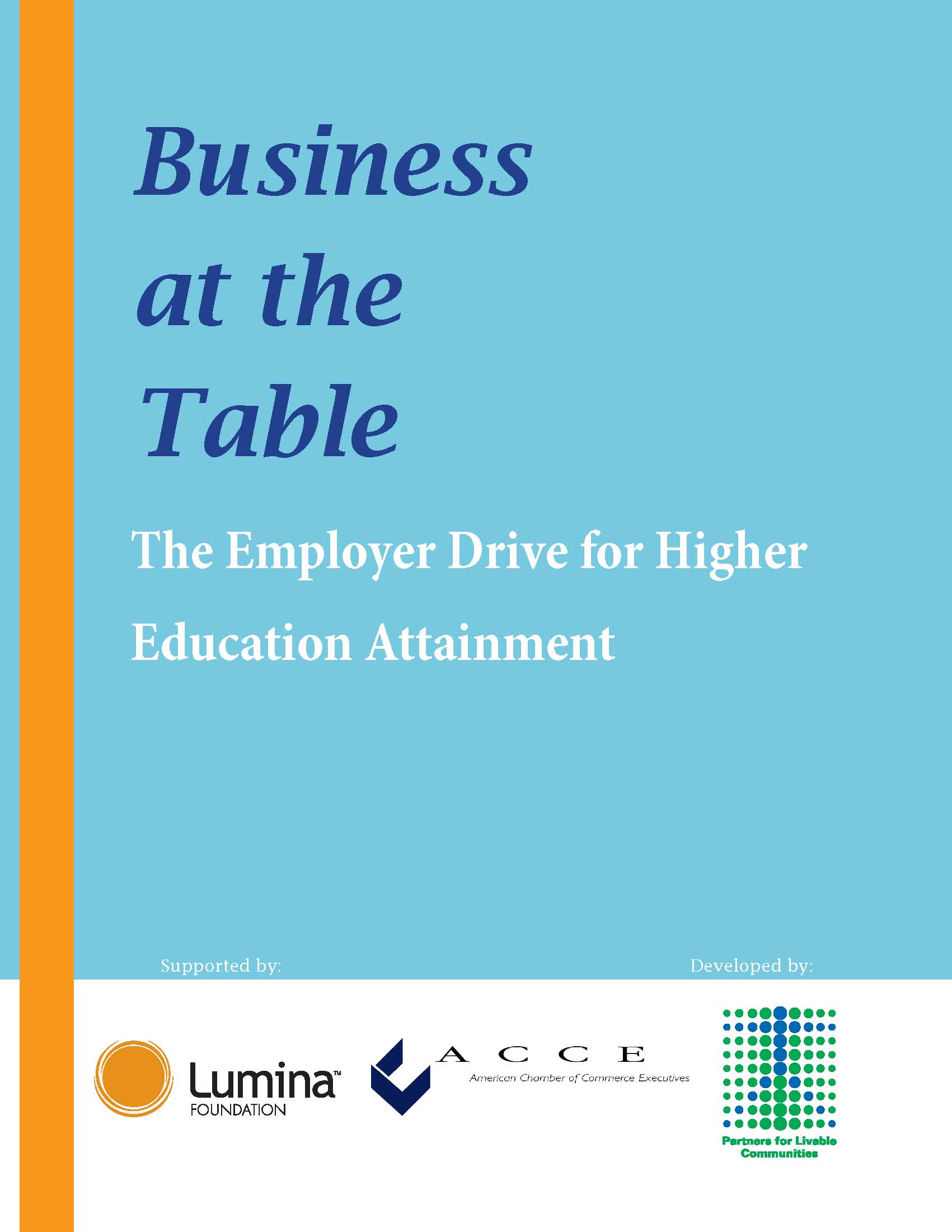 Partners for Livable Communities (Partners), in partnership with the American Chamber of Commerce Executives (ACCE) and with funding from Lumina Foundation, releases Business at the Table: The Employer Drive for Higher Education Attainment. This collection of case studies was created during the Business at the Table initiative to develop strategies for improving U.S. higher education attainment (degrees and credentials) through chamber of commerce and business involvement. Partners for Livable Communities (Partners), in partnership with the American Chamber of Commerce Executives (ACCE) and with funding from Lumina Foundation, releases Business at the Table: The Employer Drive for Higher Education Attainment. This collection of case studies was created during the Business at the Table initiative to develop strategies for improving U.S. higher education attainment (degrees and credentials) through chamber of commerce and business involvement.
This compendium of case studies provides business and chamber leaders the perspective to further Lumina’s Goal 2025: to increase the proportion of Americans with high-quality degrees and credentials to 60 percent by the year 2025. Included are programs led by chambers of commerce, two-year and four-year colleges and universities, and national and local higher education achievement programs. Interviews were conducted with the CEO or director of each program, providing personal accounts of trials and victories on the road to success. Case studies explore the history of the program or organization, key players, geographic context, specific place-based economic challenges that were overcome, and the short and long-term goals that have been achieved.
Read more »
Eight partnerships in San Diego County were each awarded a "JumpStart the Conversation" grant on June 26, 2008.
The winning projects exemplify the use of innovative ideas focused on creating livable communities for all ages and the theme of "lifelong learning for older adults." These strategies, especially those aimed at the more than 11 percent of the San Diego County's population who are 65 years old and over, help strengthen "aging in place" services and help to create opportunities for older adults to acquire new knowledge and skills. Click here to view the grants below.
The grants were introduced after a workshop, titled Enhancing Lifelong Learning: Developing a Livable San Diego County for All Ages, which took place in March at the San Diego Health Services Complex. The workshop was one of a series of regional workshops focused on creating livable communities for all ages. The workshops and grants are part of a national Aging in Place Initiative undertaken by Partners for Livable Communities (Partners) and the National Association of Area Agencies on Aging (n4a), with funding provided by MetLife Foundation.
The workshop was hosted by the County of San Diego Aging & Independence Services (AIS) department. Grantees were announced at Aging Summit 2008, held at Town and Country Resort on June 26.One grant recipient, Peninsula Shepherd Senior Center, will use the award to partner with Sharp HealthCare to create an Older Adult Healthy Lifestyle workshop, focusing on the theme of lifelong learning for older adults.The workshop will be presented at local senior centers, churches and libraries.
"With the aging of the baby boomers, it will be important to develop an educational tool for helping people stay healthy," said Jean Durgan, director of Peninsula Shepherd Senior Center. "Through this workshop, we're hoping that older adults can make changes that can possibly extend their life expectancy and help people experience a better quality of life, while remaining in their own local community."
San Diego Jumpstart Grants
- Alzheimer's Association
To expand the Memories in the Making Art Program to provide an art and brain health educational program that will target: 1) older adults who are interested in embracing their creative energies through art; and 2) caregivers seeking creative activities to enjoy with older adults they care for at home via an all-inclusive art kit.
- Bayside Community Center in partnership with San Diego Community College Continuing Education Department, San Diego Futures Foundation, and Temecula Valley Bank's Risk Management Department
To teach Linda Vista's diverse older adult population computer skills and financial basics in various native languages. This program aims to increase confidence in computer technology and independence for older adults in the community, which includes Pan Asian, African American, Chinese, Vietnamese, Latino and Caucasian populations. Instruction will highlight: financial scams targeting the senior population, Microsoft Office, financial literacy, online banking and bill paying. Local college students and professionals in the banking community will be engaged as well.
- Friends of Adults Day Health Care Centers in partnership with St. Paul's Senior Homes & Services
To launch a "JumpStart the Conversation Through a Language Curriculum" that will address the needs of non-native English speaking older adults. Older adults who attend adult day programs, specifically the program "This Day in History," will learn English through a curriculum customized to their language learning ability; become knowledgeable about events in U.S. history; enhance the health of their brains; and diminish their isolation from the majority population.
- Heritage Clinic
To develop a program for clinicians and peer counselors to assist older adult clients in exploring their individual talents through conversation and support groups; and to encourage clients to express their thoughts, ideas and expectations though a diversity of medium: painting, textile and photography and other art forms. This program aims to increase self-esteem and community awareness about older adults and their valuable contributions to the local community, and to decrease mental health symptoms. As part of this program, the clinic proposes to develop a multi-media exhibit of artwork that clients have produced. The clinic will widely promote this art exhibit at a local museum and/or a downtown San Diego venue that is well frequented.
- La Mesa Park and Recreation Foundation in partnership with the City of La Mesa and RhythmWorx
To implement "Rhythm for the Ages," a weekly exercise and educational program utilizing a variety of percussion instruments to create rhythm and movement in educational, recreational, and entertainment venues for any age. The program is designed to reinforce the benefits of a healthy active lifestyle and engage older adult participants in an enjoyable activity that stimulates cognitive processes and encourages social interaction. As a highly visible project, "Rhythm for the Ages" will also introduce area older adults to the existing variety of instructional, recreational, and volunteer opportunities available in their community.
- Peninsula Shepherd Senior Center in partnership with Sharp HealthCare
To create an Older Adult Healthy Lifestyle Workshop, focusing on the theme of Lifelong Learning for older adults. Coordinating with Sharp HealthCare, this workshop will be presented as a one-day conference or as a five-part series, each part a stand alone class. This workshop will be presented multiple times at local senior centers, churches and libraries.
- San Diego State University Research Foundation
To develop and pilot a university-based intercultural, intergenerational learning experience for older adults, called the Intercultural Conversation Partners Project (ICPP). This project will bring together a cohort of older adults and international students from the American Language Institute at SDSU for a semester of lunch programs that foster language acquisition; cultural exchange; and intergenerational learning.
- The Arc of San Diego
To pay for members of the Senior Program of The Arc of San Diego - Starlight Center to enroll in community art classes. This would enable these senior individuals to: develop creative art skills in a variety of media; connect with community art resources, studios, individuals and galleries; and place finished art works in these venues, at juried art shows and at retail sites
Read more »
|
|